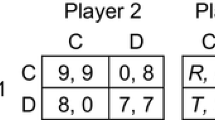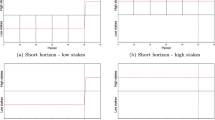Abstract
Focal points seem to be important in helping players coordinate their strategies in coordination problems. Game theory lacks, however, a formal theory of focal points. This paper proposes a theory of focal points that is based on individual rationality considerations. The two principles upon which the theory rest are the Principle of Insufficient Reason (IR) and a Principle of Individual Team Member Rationality. The way IR is modelled combines the classic notion of description symmetry and a new notion of pay-off symmetry, which yields different predictions in a variety of games. The theory can explain why people do better than pure randomization in matching games.
Similar content being viewed by others
REFERENCES
Bacharach, M. (1991), Games with Concept-Sensitive Strategy Spaces. Oxford University, mimeo.
Bacharach, M. (1993), Variable universe games, in K. Binmore, A. Kirman and P. Tani (eds.), Frontiers of Game Theory. MIT Press, Cambridge,Mass.
Bacharach, M. and Bernasconi, M. (1997), An experimental study of the variable frame theory of focal points, Games and Economic Behavior 19: 1-45.
Colman, A. and Bacharach, M. (1997), Payoff dominance and the Stackelberg heuristic. Theory and Decision 43: 1-19.
Crawford, V. and Haller, H. (1990), Learning how to cooperate: Optimal play in repeated coordination games. Econometrica 58: 571-595.
Gauthier, D. (1975), Coordination. Dialogue 14: 195-221.
Gilbert, M. (1990), Rationality, coordination and convention. Synthese 84: 1-21.
Goyal, S. and Janssen, M. (1996), Can we rationally learn to coordinate? Theory and Decision 40: 29-49.
Harsanyi, J. and Selten, R. (1988), A General Theory of Equilibrium Selection in Games. MIT Press, Cambridge,Mass.
Janssen, M. (1998), Focal points, in P. Newman (ed.), New Palgrave Dictionary of Economics and the Law (vol. II). MacMillan, London, pp. 150-155.
Janssen, M. (2000), Rationalizing Focal Points. Tinbergen Institute, Discussion Paper 00-05.
Lewis, D. (1969), Convention. Harvard UP, Cambridge, Mass.
Mehta, J, Starmer, C. and Sugden, R. (1994a), The nature of salience: An experimental investigation of pure coordination games. American Economic Review 74: 658-673.
Mehta, J, Starmer, C. and Sugden, R. (1994b), Focal points in pure coordination games: An experimental investigation. Theory and Decision 36: 163-185.
Schelling, T. (1960), The Strategy of Conflict. Harvard UP, Cambridge,Mass.
Sinn, H.-W. (1980), A rehabilitation of the principle of insufficient reason. Quarterly Journal of Economics 94: 493-504.
Sugden, R. (1991), Rational choice: A survey of contributions from economics and philosophy. Economic Journal 101: 751-786.
Sugden, R. (1995), Towards a theory of focal points. Economic Journal 105: 533-550.
Author information
Authors and Affiliations
Corresponding author
Rights and permissions
About this article
Cite this article
Janssen, M.C. Rationalizing Focal Points. Theory and Decision 50, 119–148 (2001). https://doi.org/10.1023/A:1010349014718
Issue Date:
DOI: https://doi.org/10.1023/A:1010349014718




